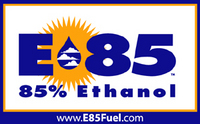RINs-driven economics favorable for increasing E85 pumps to better serve current and growing flex fuel vehicle fleet
 |
WASHINGTON--Nov. 6, 2013: A new paper by Iowa State University economists Bruce A. Babcock and Sebastien Pouliot finds that the dire scenario promoted by the petroleum industry of higher fuel prices caused by increased RFS ethanol mandates can not occur without formation of an illegal cartel and that financial opportunities created by the RINs market create alternative compliance opportunities. Babcock and Pouliot posit that higher RFS ethanol requirements encourage the vehicle fuels marketplace to innovate and create new infrastructure that allows them to reduce the cost of increasing the percentage of ethanol blended into each gallon of gasoline.
The blend wall refers to the point at which ethanol blending at 10 percent of every gallon of gasoline produced is no longer sufficient to meet EPA's RFS mandate. The American Petroleum Institute (API) has called the blend wall an insurmountable barrier to which the petroleum market will respond to by reducing the overall motor fuel supply. Shorting the fuel market will trigger an upward spiral in fuel prices and cost the U.S. economy a startling 5 percent of current GDP, according to an API-commissioned study.
"The problem with the API study is that it relies on the assumption that businesses have no available options to meet their RFS obligations except to cut fuel sales to make the cumulative market smaller, and thereby retreat from the blend wall. This is simply not true, there are viable options versus restricting supply and driving up prices," stated Bruce Babcock. "A more likely scenario is for companies affected by the RFS to evaluate available options and pursue an option that offers the greatest financial return over the longest term, even when an upfront investment is required."
The Babcock/Pouliot paper compares the financial outcomes of the API scenario of reducing domestic fuel sales to avoid mandate penalties with the alternative of altering the channel to provide higher ethanol blends: installing pumps capable of selling E85 to the 16 million flex fuel vehicles currently on the road. In the latter scenario, fuel producers and blenders benefit financially above the sale of the fuel by accumulating and selling RINs, a tradable commodity that gasoline producers and importers need to comply with the RFS mandate. The API scenario of lower production is only plausible if oil companies act together in unison to form a cartel.
The financial benefit of moving to higher blends is immediate, according to the financial analysis presented and constructed using 2013 costs. Moreover, increasing quantities of high blend E85 pumps in underserved markets creates a sustainable inventory mechanism for accumulating RINs into the future.
Babcock/Pouliot say that if the federal objective is to continue to grow the amount of renewable transportation fuel in the U.S. market, setting mandates beyond the blend wall stimulates the fuel marketplace to find the least-cost way of compliance.
"A potential marketplace today exists for higher blends of ethanol with 16 million flex vehicles on the road, but these vehicles cannot easily locate pumps with higher blends," added Babcock. "Maintaining high mandates forces industry to consider alternative pathways to compliance. Once such pathway is to locate pumps where fleets of flex fuel vehicles exist and then profit greatly from the higher volume and higher revenue boosted by new RIN sales."
The 'RFS Compliance: Death Spiral or Investment in E85?' is one of three new papers on the RFS published by The Center For Agricultural And Rural Development in recent weeks. The other two—'How Much E85 Can Be Consumed in the United States' and 'The Economic Role of RIN Prices'—are accessible on CARD's website.
About The Center For Agricultural And Rural Development (CARD) The Center For Agricultural And Rural Development (CARD) was founded by Earl Heady in 1958 and celebrated its 55th anniversary in 2013. Located at Iowa State University, CARD conducts innovative public policy and economic research on agricultural, environmental and food issues. CARD researchers develop and apply economic theory, quantitative methods, and interdisciplinary approaches to create relevant knowledge that is communicated to policy makers and policy stakeholders.


